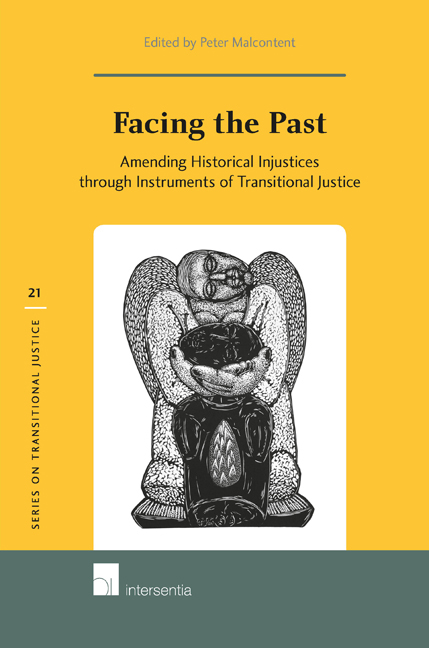Book contents
- Frontmatter
- Acknowledgements
- Contents
- PART I TRANSITIONAL JUSTICE. WHAT'S IN THE NAME?
- PART II RETRIBUTIVE JUSTICE
- PART III RESTORATIVE JUSTICE
- PART IV PENDING CASES
- The Unfulfilled Promise of Protection. The Netherlands and Srebrenica
- Facing the Armenian Genocide. A History of Denial and Politics
- The United States and Torture. The Politics of Transitional Ju
- Author Information
The Unfulfilled Promise of Protection. The Netherlands and Srebrenica
from PART IV - PENDING CASES
Published online by Cambridge University Press: 15 December 2017
- Frontmatter
- Acknowledgements
- Contents
- PART I TRANSITIONAL JUSTICE. WHAT'S IN THE NAME?
- PART II RETRIBUTIVE JUSTICE
- PART III RESTORATIVE JUSTICE
- PART IV PENDING CASES
- The Unfulfilled Promise of Protection. The Netherlands and Srebrenica
- Facing the Armenian Genocide. A History of Denial and Politics
- The United States and Torture. The Politics of Transitional Ju
- Author Information
Summary
INTRODUCTION
The Srebrenica tragedy stands out as one of the blackest pages in post-war human rights history. In July 1995 an estimated nine thousand Muslim men were slaughtered by Bosnian Serb forces. A Dutch United Nations battalion (Dutchbat) had been tasked with shielding the Muslim population of Srebrenica. But the Dutch unit proved unable to stop the Bosnian Serb assault and prevent the subsequent massacre. The tragedy has haunted the UN and the Netherlands since those fateful days of 1995. Critics have consistently underlined the unfulfilled promise of protection by both the UN and the Netherlands. British journalist Robert Fisk, for example, wrote scathingly: ‘Why, one keeps asking oneself, were these Dutchmen in uniform in the first place? Aren't soldiers occasionally expected to fight, even to die?’
This intensely emotional event offers a meaningful case study regarding the complex problem of finding remedies for grave historical injustices. This chapter will look more closely at the attempts of Srebrenica survivors and their sympathisers (mostly human rights NGOs and lawyers, left-wing politicians and intellectuals) to seek remedies from Dutch authorities and the UN via the Dutch judicial system. So far, this has proven to be a time-consuming and arduous process, laden with recriminations and sensitivities. Two civil lawsuits before the Dutch District Court in The Hague will figure prominently here. The actual claims by the Srebrenica survivors as well as the dispositions of the Dutch authorities and the District Court in The Hague itself provide a telling insight into the problems – legal, practical and political – plaintiffs from Srebrenica have encountered in their search for apologies and compensation. This case study also allows us to analyse more broadly the UN's responsibility when it comes to peace operations that have turned sour and the way the organisation addresses claims from victims. As will become evident, the District Court in The Hague based its arguments time and again on the political reality of an imperfect UN system and on the unsatisfactory instrument of UN peace operations.
THE EVENTS
In 1993 the UN Security Council established ‘safe areas’ to protect six hard-pressed Muslim enclaves in Bosnia-Herzegovina that were surrounded by Bosnian Serb troops. Soldiers from the United Nations Protection Force (UNPROFOR) were tasked with safeguarding the local population in all six safe areas.
- Type
- Chapter
- Information
- Facing the PastAmending Historical Injustices Through Instruments of Transitional Justice, pp. 323 - 338Publisher: IntersentiaPrint publication year: 2016



